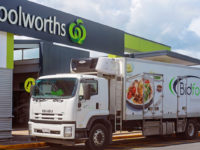 The NSW Food Authority is urging people to check if they have any eggs stamped BEC or BEC115 as they may be contaminated with a particular type of salmonella.
The NSW Food Authority is urging people to check if they have any eggs stamped BEC or BEC115 as they may be contaminated with a particular type of salmonella.
A Prohibition Order was placed on the business that produced the eggs earlier in January preventing them from selling eggs.
“While it is likely that most affected eggs are no longer in the supply chain, it is possible that people may have purchased them earlier and still have some at home in the fridge or pantry,” Dr Szabo said.
“We’d just like people to check and if they do have any eggs stamped BEC or BEC115 to throw them out to avoid any risk of food poisoning.”
The stamp will be found on the shell of individual eggs, not on the carton.
NSW Food Authority CEO Dr Lisa Szabo said thanks to mandatory egg stamping required in NSW, the Food Authority has been able to isolate the particular batch of eggs.
“All other eggs are safe to eat, provided people exercise the usual caution required for a special care food like eggs such as washing your hands and avoiding raw egg products particularly if you are a vulnerable population such as the immune compromised, under two or over 70 years of age or pregnant,” Dr Szabo said.
“It is important to know that not all eggs are impacted but if you have any stamped with BEC or BEC115 we recommend as a precaution that you discard them.
“We typically see a rise in Salmonella during the warmer summer months, so this is an opportune time to remind people to practice good hygiene generally when preparing food and to always keep their hands, surfaces and utensils clean and dry before and after handling eggs.”
Salmonellosis symptoms include fever, headache, diarrhoea, abdominal pain, nausea and vomiting and usually take hold around six to 72 hours after the contaminated food is eaten. Symptoms usually last for four to seven days but can continue for much longer.
Any consumers with immediate health concerns are advised to contact a medical professional.
In January, 412 cases of salmonella infection have been notified, which is similar to figures for the same period in recent years.
Children under 5 years of age account for most cases notified this month, although all age groups are affected.

Organic Milk recalled over potential E.Coli contamination
In other news, Organic Milk Group (OMG) has ordered an urgent recall due to microbial (E.coli) contamination.
The affected product, OMG Organic Milk 1 Litre with a Best Before date of February 4, has been available for sale at Woolworths, IGAs, Salamanca Fresh, Hill Street Grocer and independent grocers in Tasmania.
“Please be advised that due to low level microbial contagion of OMG Organic milk with a best before date of 4th February ONLY, we are taking the precaution of conducting a consumer recall of this product,” the brand said.
Customer are advised to return the product to place of purchase for a full refund.
E. coli can cause health problems including vomiting, nausea, fever and diarrhoea.















